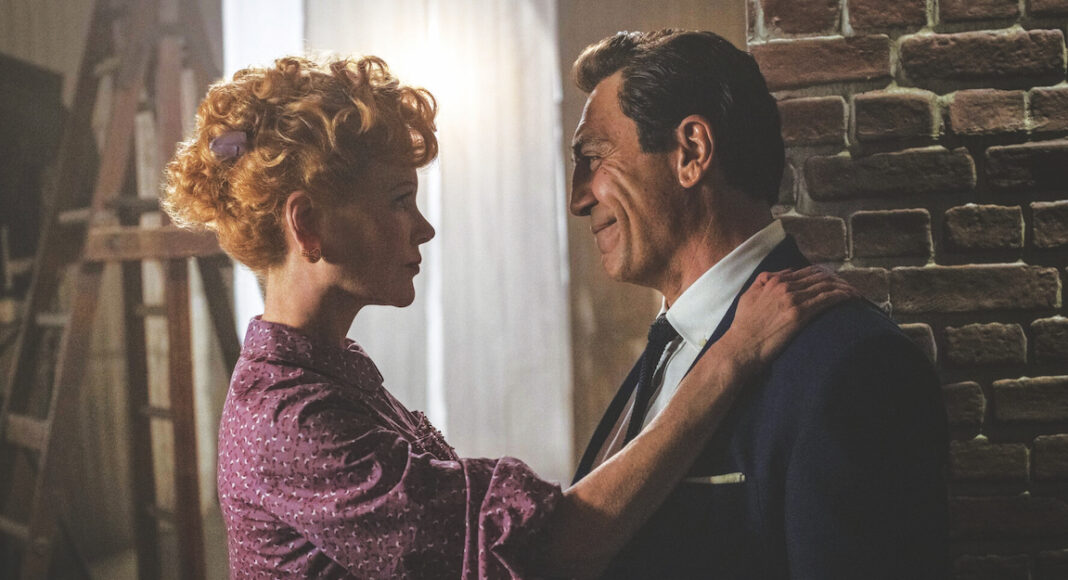Nicole Kidman may not be the first person you’d think of to play the role of beloved TV comedy icon Lucille Ball, but she gives a smart, splendidly nuanced performance in Aaron Sorkin’s Being the Ricardos. This entertaining backstage look at the classic TV comedy series I Love Lucy is also a sharply observed portrait of 1950s America filtered through the lens of a show we now think of as quintessential to its era, though it was considered weirdly iconoclastic at the time.
During one intense week in the production of the show, writer-director Sorkin explores the larger story of Lucy’s romance, marriage, and professional partnership with Desi Arnaz, the charismatic Cuban bandleader who became an improbable American TV star when he and Ball played Ricky and Lucy Ricardo in I Love Lucy. Desi is played with impressive panache by Javier Bardem; he doesn’t look much like Arnaz, but Bardem captures Desi’s vivacious public persona as well as his darker complexities. He and Kidman make a prickly, seductive, bittersweet dance of Lucy and Desi’s relationship.
Set against the frenzied anti-Communist “Red scare” witch-hunting of the late 1940s and ’50s, the plot is launched with a Walter Winchell radio broadcast slamming Lucille Ball as a card-carrying Communist, leading to what participants recall as the worst week in the show’s production history. While the writers, producers, network and sponsors brace for the fallout next day at rehearsals, a concurrent story in the scandal sheet Confidential claims Desi is cheating on Lucy with another woman.
As if the show’s weekly production schedule wasn’t tense enough, the writers and showrunner also have to clear everything with the sponsor’s rep at the first read-through. Co-stars Vivian Vance and William Frawley (Nina Arianda and J. K. Simmons, both terrific)—who famously hated each other in real life—snipe constantly in rehearsals as neighbors Fred and Ethel Mertz, and the director of the week is a hack nobody respects.
It’s great when Lucy envisions the gags during the initial script read-through in black-and-white snippets that recreate some of the show’s most beloved scenes—like Lucy stomping grapes barefoot at an Italian vineyard. (In these moments, Kidman replicates Lucy to an astonishing degree.) She fights with quiet determination when the writers sacrifice logic to get a laugh, and she and the one female writer on the show (a notable Alia Shawkat) wrangle to give the actress plenty of business to show off her genius for physical comedy without letting the character appear stupid or infantile.
Lucy admits to joining the Communist party at age 20 to please her grandfather, but has not so much as attended a meeting—let alone embraced the ideology—since. Desi also has an explanation for the scandalous Confidential photo that Lucy knows is true, but she also knows the temptations of a musician’s life on the road are often irresistible.
So when Lucy, dropped from her B-movie contract to segue into a successful radio domestic comedy, is approached to take the show to TV on the fledgling CBS network, she refuses unless the part of her husband is rewritten for Desi. Sorkin shows the passionate fury with which they met and married while both contract players at RKO Studios, then gives Kidman a wistful monologue about the Ricardos’ apartment set providing the cozy stability she craves in real life. In that context, Ricky’s famous catchphrase, “Lucy, I’m home!” becomes freighted with meaning.
For sheer entertainment, there’s Bardem in a fluffy shirt playing the conga drum and singing “Babalu,” and the unilateral freakout of the brass when Lucy and Desi insist her real-life pregnancy be scripted into the show—for fear of tainting the Ricardos’ perfect domestic bubble with even a suggestion of the messy biology by which pregnancy occurs. Rescuing the show and its creators from the realm of comfy nostalgia, Sorkin celebrates a surprisingly radical moment in American pop culture.
BEING THE RICARDOS
(***)
With Nicole Kidman and Javier Bardem. Written and directed by Aaron Sorkin. An Amazon Studios release. Rated R. 125 minutes.














